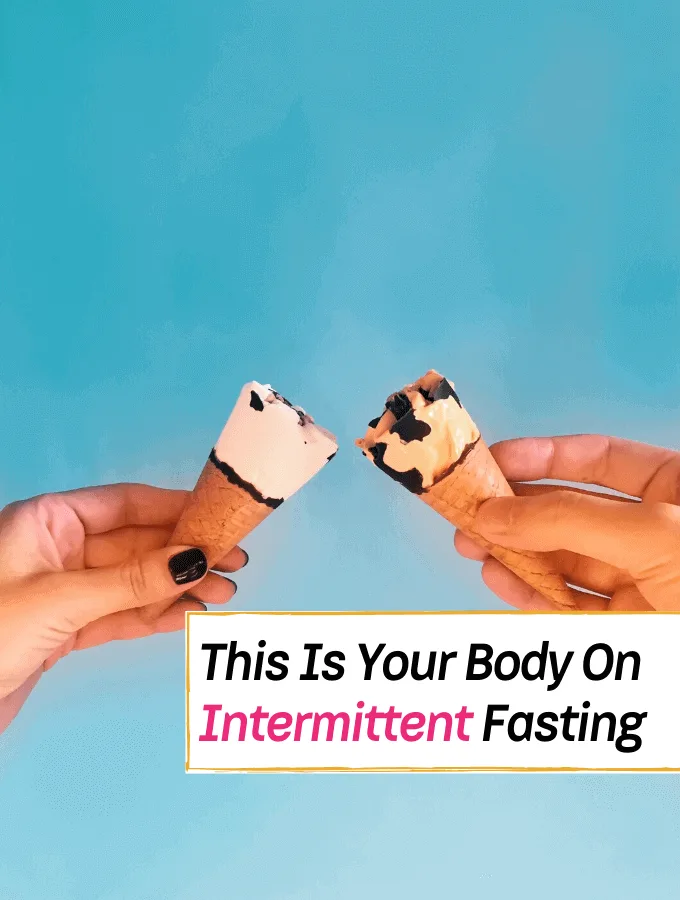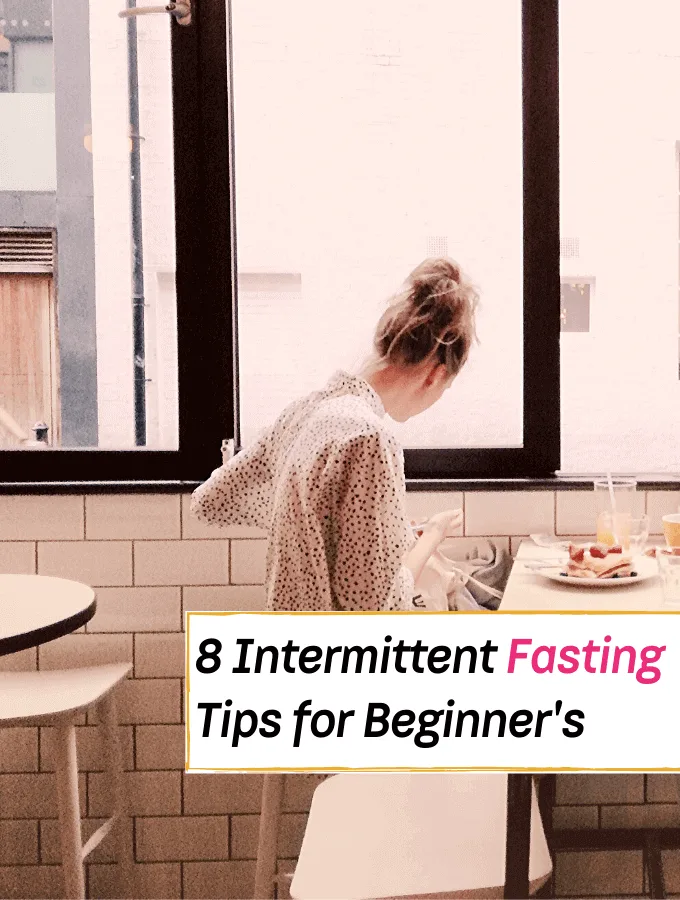Intermittent fasting and weight loss? Does it affect the body? Here’s what the body does Mentally, Physically, and Emotionally while fasting!

So, you’ve heard about intermittent fasting and are wondering what all the buzz is about?
Or maybe you’ve never heard anything about it, and it’s totally foreign to you?
Either way, this article should put your mind at ease and answer some of the most commonly asked questions about intermittent fasting, (especially for women).
So, whether you are interested in fasting for weight loss, or for any of the other intermittent fasting benefits, it is absolutely worth knowing about the process first and how the body handles it, and if it’s the right thing for you to do.
Similar topics:
8 Food Habits That’ll Help You Keep the Weight Off
8 MORE Intermittent Fasting Tips for Beginner’s
16/8 Intermittent Fasting: Food Plan and Schedule
What is Intermittent Fasting?
Intermittent fasting refers to an eating style that alternates between eating and fasting. It doesn’t say which foods you should eat but when.
There are many intermittent fasting options. Each one divides the day into eating and fasting times.
People “fast” almost every day while they sleep. Intermittent fasting is as easy as prolonging the fast for a bit longer.
This can be done by skipping breakfast and eating at noon, followed by 8 pm for your last meal.
Let’s break down what intermittent fasting is a little bit, with the help of a good old-fashioned Merriam-Webster dictionary;
Intermittent – coming and going at intervals; not continuous.
Fasting – to abstain from food.
Taking the two words at face value, we can see that intermittent fasting is literally abstaining from food at intervals of time. It’s a little more complicated than that though which you will soon understand when you read the other factors.
But let’s go over what Intermittent fasting is not!
What are some Intermittent Fasting Benefits?
The entire idea of intermittent fasting is to avoid eating food for a prolonged period of time, from usually within 12 to 18 hours. And not eating for a longer period of time may not sound like a whole lot of fun.
So what’s the catch? What are the benefits?
First and foremost is the most obvious; weight loss.
It’s no surprise that avoiding food for an extended period of time will help you lose weight. In fact, many people do this kind of fasting for strictly weight loss and many people have had incredible results.
It doesn’t stop there though. There are also other reasons, with weight loss excluded, that you may want to try an intermittent fast for the first time.
Intermittent fasting benefits that people are reporting:
- Lower blood sugar and insulin levels
- Improved energy and concentration levels
- Reduction of inflammation
- Better cholesterol levels
- Clean gut health
- Longevity
Popular: 7 Daily Habits to Help Boost Your Mood
Why Do an Intermittent Fast?
Humans have practiced fasting for thousands of years.
Sometimes, it was necessary because there wasn’t enough food. Other times, it was done to fulfill religious obligations. Fasting is required by many religions, including Christianity, Islam, and Buddhism.
It is not “unnatural” to fast, and our bodies can handle prolonged periods without eating.
For our bodies to survive during periods of famine, many processes within the body are affected. It all has to do with hormones, genes, and other important cellular repair processes.
Intermittent fasting has become very popular for people who want to lose weight. It’s a simple, effective way to reduce calories and burn fat.
But people also do fasting for metabolic benefits. It can help improve many risk factors and other health markers in the body.
Intermittent fasting may also be beneficial in prolonging your life. Intermittent fasting can prolong your lifespan just as well as calorie restriction, according to rodent studies.
How does Intermittent Fasting work?
Let’s admit it, most of us eat too much!
We eat way more than we actually need to. And when we overeat, our bodies produce insulin, a hormone responsible for the storage of food energy.
When it does this, much of the food we eat gets broken down into glucose, which chains together to make glycogen.
Glycogen then gets stored in the liver and muscle tissues – all of this happens when our bodies are enjoying and storing food in our fat reservoirs.
During this process, this is where things can turn sour.
When the body is reserving fat for our bodies, it is conserving this fat, instead of using this fat. And this is what causes people to gain weight.
Why is Intermittent Fasting so Popular?
Since the body can’t handle too many carbohydrates at one time!
Or if we consume too many non-nutritious foods the body gets overloaded easily and then that leftover glucose gets transformed into fat.
This is why intermittent fasting has gained a lot of popularity.
When we do intermittent fasting and refrain from eating for an extended period of time, our insulin levels will naturally lower.
This means that the body begins to burn our stored sugar and fat reservoirs because we are allowing it the time and space (during our fasts) for our body to eat away at those reservoirs.
In short, intermittent fasting basically gives the body a rest from eating by allowing it to use up some of that “stored up fat energy” your body has saved for you.
This Is Your Body On Intermittent Fasting

Mentally.
Maybe there’s an explanation of why most of the major religions in the world call for periodic fasting because intermittent fasting at its very heart is about maintaining mental control over hunger.
This requires ignoring the body’s signs of hunger which, incidentally, is caused by a hormone called glucagon.
When you are in a fast and ignoring your body’s hormone, which is basically telling you to eat, in doing so, this awakens the senses and even can enhance your brain activity.
You can think of it as a mind-over-matter challenge.
To some, intermittent fasting can lead to a breakthrough, that is conquering the mind and taking control. To others, it can lead to feelings of tiredness and mental fatigue, particularly early on.
Your mentality and how your next “hangry” episode is handled, could be handled with grace or stress, it really depends on if you are fasting properly.
Physically.
Positive physical side effects of Intermittent Fasting:
Most people who take part in intermittent fasting reported increased well-being in their gut.
Fasting also allows the body a chance to relax and reboot since your digestive tract does so much on a daily basis. The digestive tract can finally have a rest and doesn’t have to deal with some painful food symptoms such as gas, irritation, and bloating.
Another important note is intermittent fasting also physically reduces blood sugar, decreases insulin levels, and helps anyone who wants to lose weight by decreasing their overall calories.
But it doesn’t stop there for the physical body…
According to recent studies, intermittent fasting is also associated with a reduced risk of chronic illnesses such as diabetes and cardiovascular disease.
This is because fasting decreases inflammation in the body and reduces inflammation. Doing so, fasting also helps our cells battle multiple chronic inflammatory conditions such as obesity, hypertension, and irritable bowel conditions.
To top it off research also suggests intermittent fasting will help the body more efficiently maintain lean muscle.
Negative physical side effects of Intermittent Fasting:
Long-term fasting can cause anemia, a weakened immune system, liver and kidney disorders, and heartbeat irregularity.
Fasting can also lead to vitamin, mineral, and muscle deficiencies.
Those who are new to fasting can also expect to feel dizziness, headaches, low blood sugar, muscle aches, exhaustion, or fatigue during their first fast.
It’s also not uncommon for hormonal imbalances to happen during an intermittent fast cycle, and this is explained further in the article.
All in all, Fasting is all about listening to the body!
Emotionally.
Fasting for some can be really difficult when emotions are getting involved but if you can stick with it, you could have the potential to reset your emotional negative habits with an intermittent fast.
In life, we can get all caught up in odd emotional loops, and fasting may break you free from them — helping you to experience the world in a much clearer way.
The reason for this is the gut plays a vital role in our emotions.
Naturally, when fasting gets introduced to the body, it can help you clear unnecessary emotional baggage that the gut previously used to carry on to.
Now there is another side to Intermittent fasting that also has a profound effect on the body emotionally and that is emotional eating.
When it comes to emotional eating, fasting can also cause “fear of loss of control (with food)” and “overeating during uncontrolled days”.
These are key indicators of an emotional state that is classified as a binge eating disorder.
Whether you are fasting for the first time, for weight loss, or if you are fasting just to clear out your nervous system, know that fasting can lead to severe emotional eating once the windows to eat is open.
And if you don’t pay close and careful attention to your safety, you might fall at risk to this negative cycle.
Another thing that is good to point out, is people also get really emotional during their first intermittent fast.
This may have to do with lack of nutrients if you are fasting improperly which is also further explained below (keep reading!).
Popular: 8 Food Habits That’ll Help You Keep the Weight Off
The Big Question: Is Intermittent Fasting for You?

This is a big question that a lot of people ask themselves and wonder about.
“Is this type of eating schedule really for you?”
And how exactly do you do intermittent fasting effectively if you are worried or excited about what you just read about the process?
Well, for starters, health practitioners recommend that most people tend to follow what is called the 18/6 method.
What is 18 6 intermittent fasting?
Simply put, your fasting window is for 18 hours, and then you give yourself a 6-hour window to eat.
Many people doing the 18/6 fasting method skip breakfast and eat their first meal around lunchtime. If you eat your first meal of the day at 12 PM, then you have until 6 PM to have your last meal. After your 6 PM meal, you will want to refrain from eating until 12 o’clock the next day, giving you 18 hours without food.
The good news is, you can eat whenever you want during this 6-hour window. However, this doesn’t mean that you can gorge yourself on all kinds of junk food.
During your time intermittent fasting, you’ll want to eat highly nutritious foods.
And of course, you should always be eating these kinds of foods, but they’re especially important during an intermittent fast.
Two Key Takeaways for your first Intermittent Fast.
Now that we have gone over what the body goes through during a fasting period. Here are two key takeaways that you should strongly keep a lookout for when you are fasting for the first time:
Fluctuating Mood and Energy:
You may experience mood swings or changes in your energy levels during your first fast.
Many people also get emotional during intermittent fasting. This mostly has to do with a lack of nutrients, so as said earlier, it’s important to eat nutrient-rich foods during the process.
Over time, your body will adapt to the eating schedule and your energy and moods will most likely even out.
You can even expect to possibly conquer “food mood swings”. This is because when you’re doing intermittent fasting for a couple of days, your body releases a chemical called Ghrelin (Ghrelin’s main function is to increase appetite).
When you apply mind over matter when your body is telling you to eat and you say no, it can give you a sense of confidence and control.
On the other hand, if you find yourself too emotional during your intermittent fast, you may want to take a step back.
Hormonal Imbalance:
When it comes to strict intermittent fasting cycles, it’s also not uncommon for women to experience hormonal issues and imbalances while fasting.
It’s been recorded that women have also lost their mental phase and have had issues with their thyroid hormone production during a fasting cycle.
This is because the menstrual cycle is very closely tied to calorie intake, and calorie restriction could lead to a host of imbalances.
So, if you think you may have an issue with these side effects, then try a less intense fasting schedule.
For instance, you could choose a few days out of the week and do intermittent fasting on nonconsecutive days for 12 or 14 hours.
Another popular method of fasting for women is to do a 24 hour fast once or twice a week to see how your body feels.
Talk to Your Health Care Provider.
Before you start any fast, or if you’re currently in one right now, make sure you stop if you believe this wellness approach has a negative effect on your body and your life.
Talk with your doctor if you are a woman experiencing any of the following…
- Diabetes or low blood sugar
- Fertility problems or missed period
- Any history of eating disorders
- Pregnancy, currently breastfeeding or attempting to conceive
There you have it! Whether you are interested in fasting for weight loss, or for any of the other intermittent fasting benefits, it is absolutely worth a try!
At the end of the day, the only way to know for yourself is to try it out and see how you feel.
Just ease into it slowly and enjoy yourself and stay healthy.
Hopefully, this intermittent fasting guide has helped you to get a clearer picture of what intermittent fasting is all about.
If you would like some more good pointers? Here’s another article with 8 extra helpful intermittent fasting tips, if you do decide that fasting is what you would like to try out.
See Also:
For more intermittent fasting tips check out, 8 Do’s and Don’ts for Intermittent Fasting for Beginners, next!
You may also like:
16/8 Intermittent Fasting: Food Plan and Schedule
10 Approved Lazy Girl Fitness Hacks to Exercise Easily
4 Quick and Easy HIIT Workouts for Beginners
8 Food Habits That’ll Help You Keep the Weight Off
Author: Everything Abode
Welcome to Everything Abode, your daily inspiration for every activity at home!
Our goal is to inspire you to live an elegant and chic lifestyle from the comfort of your home.
We’ll help you express yourself through authentic style, aesthetic beauty, and stylish home decor.
Subscribe to Get the Tools That Make My Blog Successful!

When you join my newsletter, I'm going to send you insider advice and tools that I use to grow my blog! I only save the BEST for my email list so don't wait!

